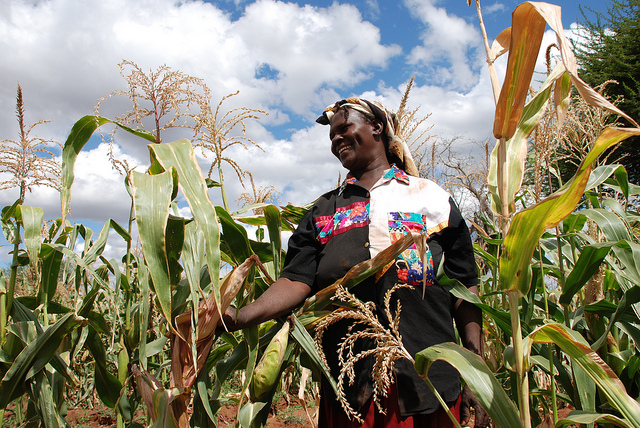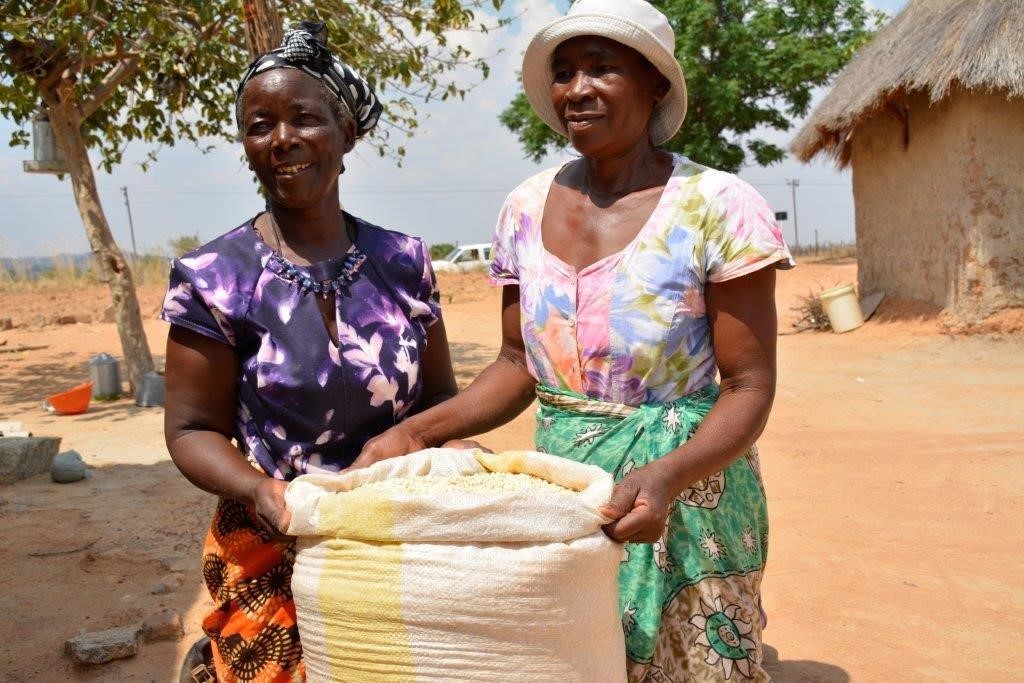Climate adaptation and mitigation
Climate change threatens to reduce global crop production, and poor people in tropical environments will be hit the hardest. More than 90% of CIMMYT’s work relates to climate change, helping farmers adapt to shocks while producing more food, and reduce emissions where possible. Innovations include new maize and wheat varieties that withstand drought, heat and pests; conservation agriculture; farming methods that save water and reduce the need for fertilizer; climate information services; and index-based insurance for farmers whose crops are damaged by bad weather. CIMMYT is an important contributor to the CGIAR Research Program on Climate Change, Agriculture and Food Security.
Breakthroughs in agriculture for action on climate change
 Climate adaptation and mitigation
Climate adaptation and mitigation
Climate change presents a formidable challenge as one of the biggest constraints to improving food systems, food security and poverty alleviation around the world, especially for the world’s most vulnerable people.
New Publications: Study shows benefits and trade-offs of conservation agriculture in southern Africa
 Climate adaptation and mitigation
Climate adaptation and mitigation
CIMMYT with other partners combined empirical data and results from a cropping system model to quantify benefits and trade-offs of CA in southern Africa.
CIMMYT scientist takes lead role in American Agronomy Society’s sustainable intensification community
 Climate adaptation and mitigation
Climate adaptation and mitigation
Timothy Krupnik, systems agronomist at CIMMYT, leads the Sustainable Intensification community of the American Society for Agronomy’s Environmental Quality section.
Study reveals diversity “blueprint” to help maize crops adapt to changing climates
 Climate adaptation and mitigation
Climate adaptation and mitigation
Scientists unlock evolutionary secrets of landraces through a study of allelic diversity, revealing more about the genetic basis of flowering time and how maize adapts to variable environments.
New Publications: How to maintain food security under climate change
 Climate adaptation and mitigation
Climate adaptation and mitigation
An internationally coordinated approach is key to breed and deploy crops resilient to climate change effects.
Water-saving maize holds potential to boost farmer resilience to climate change in Pakistan
 Climate adaptation and mitigation
Climate adaptation and mitigation
New varieties of white maize in Pakistan have the potential to both quadruple savings of irrigation water and double crop yields for farmers.
New Publications: Africa’s future cereal production
 Climate adaptation and mitigation
Climate adaptation and mitigation
Cereal yields in sub-Saharan Africa must increase to 80 percent of their potential by 2050 to meet the enormous increase in demand for food.
Crop and bio-economic modeling for an uncertain climate
 Climate adaptation and mitigation
Climate adaptation and mitigation
The potential impact of climate change on agriculture and the complexity of possible adaptation responses require the application of new research methods and tools to develop adequate strategies, writes Gideon Kruseman.
Agricultural biodiversity key to future crop improvement
 Climate adaptation and mitigation
Climate adaptation and mitigation
Conserving and using agricultural biodiversity to create better crops can help meet several sustainable development goals and stave off further species extinctions.
Target for 10 million more climate-smart farmers in southern Africa amid rising cost of El Niño
 Climate adaptation and mitigation
Climate adaptation and mitigation
Research centers, development agencies and governments must work together to respond to climate predictions before food crises develop, say two CIMMYT scientists.
Sustainable agriculture poised to save Mayan rainforests from deforestation
 Capacity development
Capacity development
Sustainable farming practices allow smallholder farmers to improve maize yields while reducing deforestation in Mexico, report finds.
Drought- and heat-tolerant maize tackles climate change in southern Africa
 Climate adaptation and mitigation
Climate adaptation and mitigation
CIMMYT’s drought-tolerant varieties have been delivered to three million farmers across Africa.
Taking aim at climate change
 Climate adaptation and mitigation
Climate adaptation and mitigation
Check out our latest fact sheet and learn how CIMMYT is responding to climate change.
New Publications: How to better breed maize for future climates in Latin America
 Climate adaptation and mitigation
Climate adaptation and mitigation
New study reveals findings to help increase drought and heat tolerance in Latin American maize.
Growing more with less: Improving productivity, resilience and sustainability in Africa
 Climate adaptation and mitigation
Climate adaptation and mitigation
Sustainable intensification is helping farmers in Sub-Saharan Africa become more productive, while adapting to and mitigating climate change.

